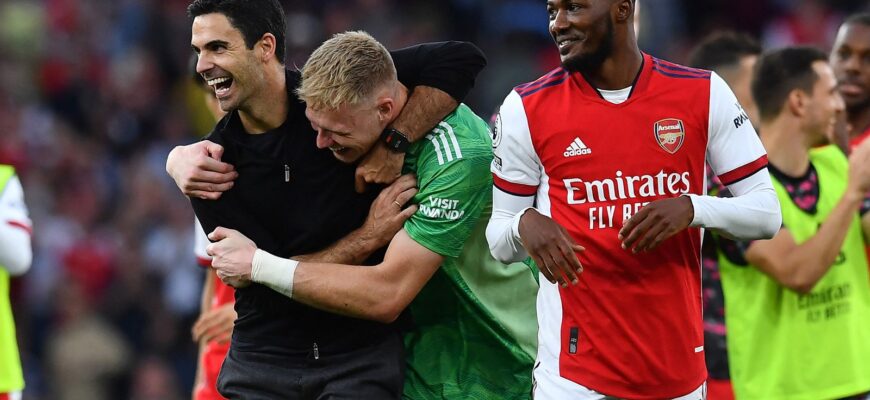In the relentless theater of Premier League football, a single result can often rewrite the entire narrative. For Mikel Arteta and Arsenal, the recent 1-0 defeat to Liverpool served as a harsh reminder of this brutal truth, reigniting a familiar, if somewhat predictable, debate surrounding their tactical approach.
Following the narrow loss at Anfield, the discourse swiftly shifted. What was previously an impressive, unbeaten run suddenly became fertile ground for critiques of a perceived “conservative” play style. The core of the complaint centered on Arsenal`s midfield selection, characterized by some observers as deploying “three defensive midfielders.” This assessment, whether entirely accurate or a convenient soundbite, clearly resonated enough to draw a pointed response from Arteta himself.
The Anatomy of Criticism: A Manager`s Perennial Challenge
It`s a curious phenomenon in top-flight football: managers often claim to ignore external noise, yet their rebuttals frequently betray a keen awareness of the prevailing opinions. Arteta`s counter-argument, referencing Mikel Merino`s hat-trick for Spain – a player some had pigeonholed as merely defensive – was a precise, if subtly ironic, jab at the superficiality of some analyses. He noted, “I don`t know when was the last attacking midfielder to score three goals. So it`s very interesting to learn what perception is, especially when you lose a football match.” This highlights the often-subjective lens through which football is viewed, particularly when a result doesn`t align with expectations.
Indeed, a singular moment of brilliance from Dominik Szoboszlai`s late free-kick was all it took to sever Arsenal`s impressive 22-game unbeaten streak against the league`s traditional `Big Six.` Yet, the post-match autopsy focused less on Liverpool`s quality and more on Arsenal`s perceived caution. Influential figures like Gary Neville echoed this sentiment, suggesting Liverpool`s belief in winning such encounters contrasted sharply with Arsenal`s alleged contentment merely not to lose. This sentiment, however, overlooks a crucial context.
Arteta`s Counter-Narrative: Beyond the Surface-Level Judgment
When assessing Arsenal`s performance, it is imperative to consider the broader circumstances. Key players like Bukayo Saka, Kai Havertz, and Ben White were unavailable, and Martin Odegaard`s fitness was a significant concern. To then compare the team`s attacking output to a fully fit squad seems a tad disingenuous. In fact, Arsenal managed more shots than their hosts and restricted one of the league`s most potent attacks to fewer penalty box touches than their own 29. These are metrics that rarely suggest a team “happy not to lose,” but rather one employing a calculated, disciplined strategy.
Furthermore, the narrative often conveniently forgets recent history. In a season where Arteta could frequently field his full-strength side, Arsenal netted a club-record 91 Premier League goals, regularly hitting two expected goals per game. Their attacking prowess, even accounting for set pieces, was undeniable. The drop in attacking output last season coincided directly with the prolonged absences of critical personnel, a causal link that seems to be understated in the rush to judgment. The team that famously ran 11 goals past Liverpool and Manchester City, or battled with ten men at the Etihad, hardly projects an image of timidity.
The Pragmatism vs. Ambition Paradox
Managing a top Premier League club involves walking a perpetual tightrope between pragmatic solidity and unbridled ambition. While Arteta might lean towards a more controlled, structured approach, it is a deliberate choice, not a sign of a lack of courage. Unlike some managers whose initial forays into English football are marked by an almost reckless abandon, Arteta`s philosophy is one of intelligent resource management and tactical adaptability. To mistake tactical discipline for a lack of attacking intent is to misunderstand the modern game`s complexities. Every top manager faces the perennial challenge of shaping a robust defense without stifling offensive creativity, and achieving that balance is a continuous, fluid process.
The Path Forward: “We Want More”
Arteta`s defiant assertion that “We want more” is less a plea and more a declaration of intent. It reflects a team that, despite a setback, recognizes its high level of performance and identifies areas for further improvement. The manager`s desire for an immediate fixture to “get the Liverpool loss out of his players` systems” speaks volumes about the collective drive within the squad. Observing key players like Merino, Noni Madueke, and Piero Hincapie excelling for their national teams only reinforces the talent pool at his disposal.
This unwavering belief within the camp bodes ill for their next opponents, Nottingham Forest. If the critical lens applied to their performance against Liverpool has indeed stung Arteta and his players, one can expect a highly motivated response. The beauty, and indeed the cruelty, of football is that perception is often reset with the very next whistle. For Arsenal, the stage is set to rewrite their immediate narrative, proving that ambition, not just caution, defines their path forward.









